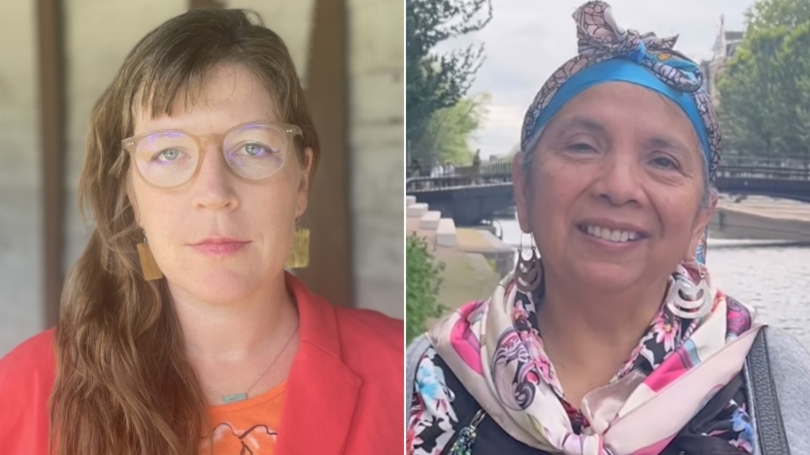
- Undergraduate
- Research
- Off-Campus Study
- News & Events
- People
Back to Top Nav
Back to Top Nav
Geographer Sarah Kelly and Indigenous leader Gladys Quintul advocate for a collaborative approach to water-related threats in Latin America.
Geography lecturer Sarah Kelly led a presentation in Amsterdam on river justice in Latin America this month with Gladys Quintul, a Mapuche-Williche Indigenous leader from southern Chile.
The presentation, which was covered by Chilean news outlets, focused on emergent water justice movements in Latin America and the need for more integrated management of river systems. It was part of a Society for Latin American Studies conference that was hosted by the Centre for Latin American Research and Documentation at the University of Amsterdam.
"I hope participants learned from our methodological innovations on how to bring together ancestral knowledge and scientific knowledge for understanding water systems, and our modeling this type of collaboration in the way we co-presented," says Kelly, cofounder and program manager of the Energy Justice Clinic.
Throughout the presentation, titled "Translocal Social Movements for River Justice in Latin America," Kelly and Quintul emphasized the need to include Indigenous perspectives in conversations and projects that address water-related threats and changes.
In an Instagram reel (with captions Kelly translated from Spanish), Quintul emphasizes the importance of their collaboration.
"One of the most important reasons [I am traveling to Europe] is to teach people about what's happening in Mapuche Indigenous lands in many facets, and to build networks to get to know other people," Quintul says. "To know what we can do if a big conflict is pushed upon us again, and to look for possible routes ahead of time."
Movements to defend Chile's rivers and waterways are on the rise in the wake of large hydroelectric projects and unclear legislation around water. These water justice movements focus on community science, participatory mapping, hydropower energy, and Indigenous rights.
Kelly and Quintul have worked together for more than a decade, beginning with Kelly's doctoral research on hydropower conflicts and Mapuche relationships to water. Quintul has also hosted Dartmouth undergraduates who took part in the Energy Justice Clinic during their off-term research in Chile. Today, Kelly and Quintul's partnership continues to grow as members of the Epulafkenmapu Collective, an intercultural water-monitoring collective in the Puelwillimapu territory.